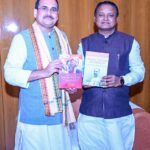Shah’s BJP is on a Journey of Recollecting its Roots
- By : Anirban Ganguly
- Category : Articles
The first week of February saw an interesting development in the BJP’s central secretariat in New Delhi—the inauguration of a library for the benefit of the workers, office-bearers and people at large. In fact, ever since Amit Shah took over as BJP president in 2014, he had envisioned the need to create a library which would act as a guiding port for workers so that they could, through the habit of reading, immerse themselves in trying to understand the evolution of an alternate political movement in post-Independence India, a movement of which they are a part.
Shah has always argued that preserving the political movement’s history and its dissemination countrywide, among workers right up to the block levels, was important in order to maintain an intellectual continuity and ideological direction. The BJP central library, thus, has started with bringing together books of the nationalist streams, party documents, books on other political parties, major political movements and periods in post-Independence India, besides periodicals and rare digital books on Indian history, culture, philosophy, political thought and religion. Shah’s idea is to eventually ensure that people from across the country have access to the digital collection and to the library.
The other dimension that the BJP president emphasises is that of documentation and scientific preservation, which he points out is essential for posterity, the party’s growth, history and evolution. “Unless we record the contributions of leaders made during the birth and growth of the party,” argues Shah, “our future workers will never realise the toil and sacrifice that has been made to reach this point.” For widening this effort of documentation, he has asked the library and documentation team to reach out to the workers at the grassroots, identify veterans among them, and involving them, start sieving out and collating any existing physical record that they may have preserved in connection to the party.
A mega outreach exercise, it is perhaps for the first time that such an effort is being undertaken—to record and document the movement for an alternate political space in post-Independence India’s history. Shah’s personal outreach on this front is exhaustive, his discovery of India detailed—he can, for example, speak at length on the contents of the various district gazetteers of the erstwhile United Province.
Another interesting point that Shah often makes is that the Jana Sangh and BJP are the only parties which have launched or directed movements essentially meant to preserve the unity and integrity of India—“we have not launched any movement for toppling any government”— he often quips. The Kutch Satyagraha, the Goa liberation movement etc. were occasions when party workers plunged headlong into trying to defend India’s unity. He never fails to point out how a large number of ordinary workers of the BJP have been killed or maimed over the years just because they struggled to establish a nationalist ideology and approach. Shah specially refers to Kerala, where innumerable BJP and RSS workers have been killed simply because they followed the democratic habit of opposition politics. He calls for documenting these. “After having faced the brunt of such violence, it is we who are being called intolerant,” says the BJP president. In course of another meeting, in an interesting aside, Shah pointed how Pattabhi Sitaramayya, the Congress archivist and historian par excellence, lamented the lack of interest in his own party for his work and the huge documents he had collected over the years.
While one party degenerates into a quasi-fascist family conglomerate supported by pseudo-Marxists, the BJP under Shah has launched into a new journey of recollecting its roots, internalising its founding vision and further strengthening its ideological foundations.

















